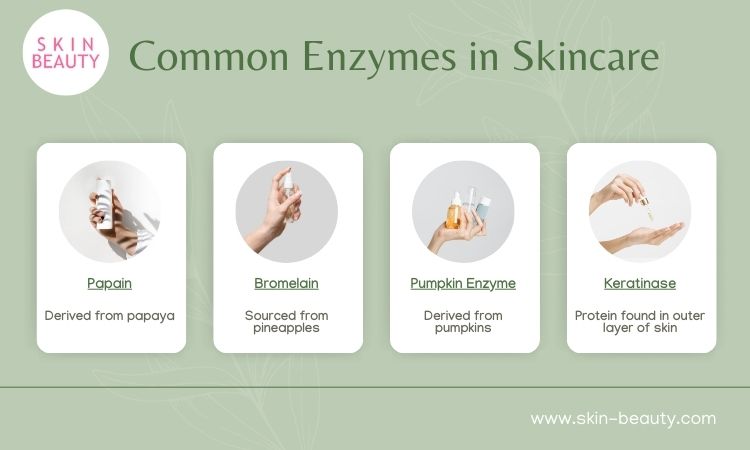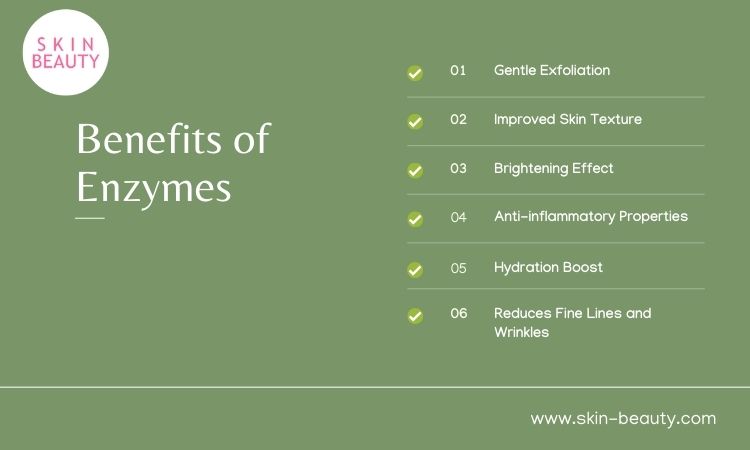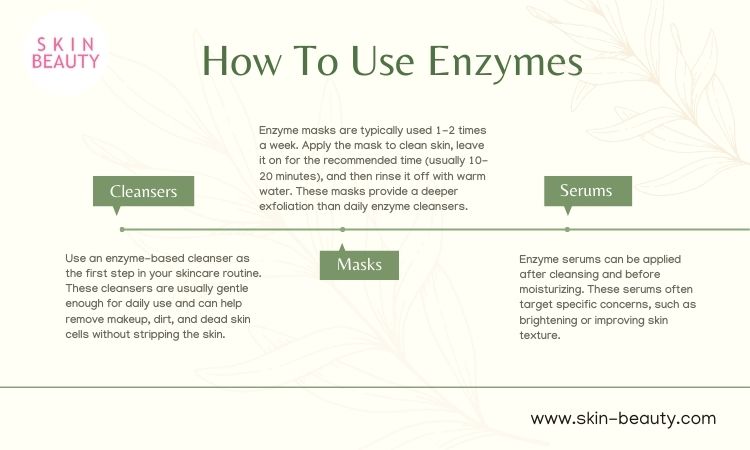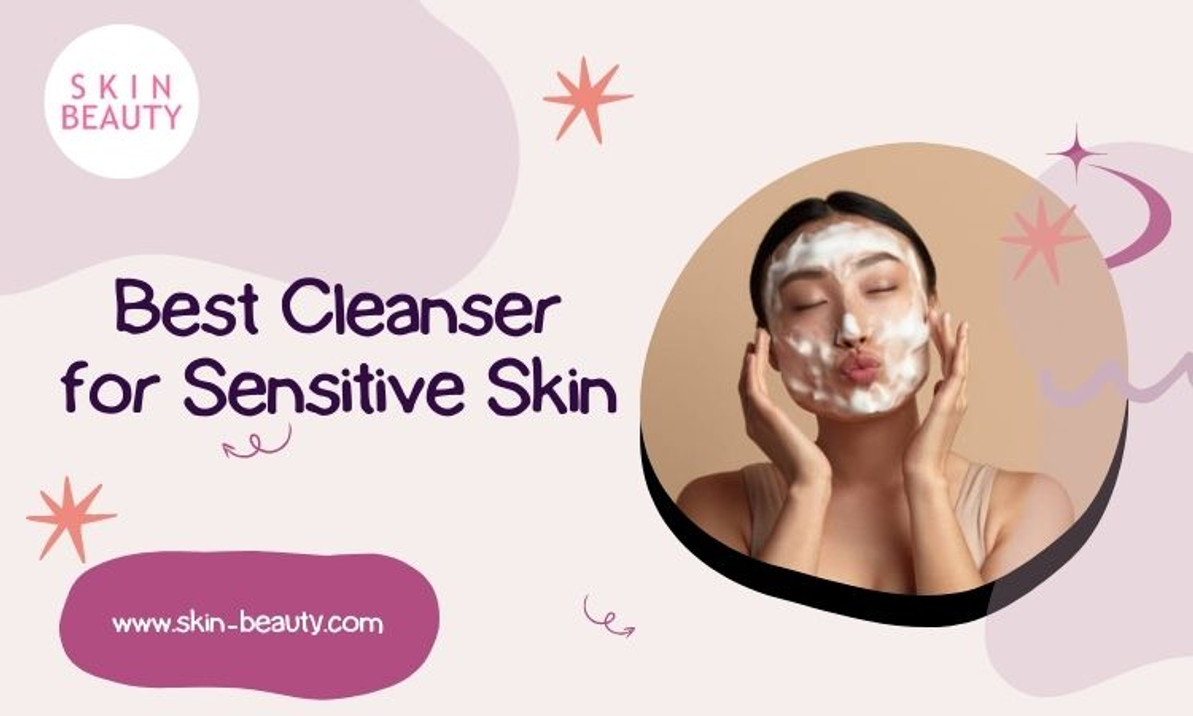Enzyme Benefits in Skincare
The Ultimate Guide to Enzymes in Skincare: Unlock the Power of Enzymes for Smooth Skin
Welcome to your ultimate guide to enzymes in skincare! In recent years, the world of skincare has embraced the incredible power of enzymes, revealing their remarkable benefits for achieving smooth, radiant, and healthy skin. This comprehensive article will delve deep into how enzymes work, their advantages for various skin types, and how to seamlessly incorporate them into your skincare routine. Let’s unlock the potential of enzymes for your skin!
What Are Enzymes and How Do They Work in Skincare?
Understanding the Role of Enzymes in Skincare
Enzymes are natural proteins that catalyze biochemical reactions, playing a crucial role in breaking down complex substances into simpler components. In the realm of skincare, enzymes work wonders by targeting dead skin cells on the surface of the skin, effectively exfoliating and promoting a smoother appearance. They operate by breaking down the bonds that hold dead skin cells together, allowing for easier removal and revealing a fresh layer of skin underneath. This natural process enhances skin cell turnover, resulting in a rejuvenated and glowing complexion. The incorporation of enzymes in skincare products has revolutionized the way we approach exfoliation, offering a gentler alternative to traditional mechanical exfoliants.
How Do Enzymes Enhance Your Skincare Routine?
Integrating enzymes into your skincare routine can significantly enhance its effectiveness. By using enzymes, you can achieve a more thorough exfoliation without the harshness that often accompanies physical scrubs. Enzymes help to dissolve dead skin cells while being gentle on the skin, making them suitable for a variety of skin types, including sensitive skin. They promote better absorption of other skincare products, allowing serums and moisturizers to penetrate deeper into the skin. This means that the benefits of your overall skincare regimen can be amplified, leading to improved hydration, reduced fine lines, and a more even skin tone.
What Types of Enzymes Are Commonly Used in Skincare Products?
Several types of enzymes are commonly used in skincare products, each offering unique benefits. Fruit enzymes, such as those derived from pineapples and papayas, are particularly popular due to their natural exfoliating properties. These enzymes not only help to remove dead skin cells but also provide additional nutrients that can nourish the skin. Other enzymes, like bromelain and papain, are known for their ability to brighten the complexion and improve skin texture. By understanding the different enzymes used in skincare, you can select products that cater to your specific skin concerns and types.

What Are the Benefits of Enzymes for Different Skin Types?
How Do Enzymes Benefit Sensitive Skin?
For individuals with sensitive skin, finding the right exfoliation method can be challenging. Fortunately, enzymes are incredibly beneficial for sensitive skin types. Unlike abrasive scrubs, enzymes offer a gentle yet effective way to exfoliate the skin without causing irritation or redness. They work on a molecular level, targeting only the dead skin cells without disturbing the delicate skin underneath. This makes enzymes an excellent choice for those who experience reactions to harsh ingredients, allowing for smoother skin without compromising skin integrity.
Can Enzymes Help with Uneven Skin Tone?
Uneven skin tone is a common concern for many, and enzymes can play a pivotal role in addressing this issue. By promoting the removal of dead skin cells and enhancing skin cell turnover, enzymes help to fade dark spots and hyperpigmentation over time. Regular use of enzyme skincare products can lead to a more balanced complexion, as they work to unclog pores and reduce the appearance of blemishes. This consistent exfoliation not only improves skin tone but also gives the skin a brighter, more luminous appearance—an essential step toward achieving that coveted glowing skin.
What Are the Advantages of Using Enzymes for Oily Skin?
Oily skin can often be a breeding ground for acne and breakouts, making it crucial to maintain a proper skincare routine. Enzymes are particularly advantageous for oily skin types due to their ability to gently exfoliate and unclog pores. By breaking down the buildup of excess oils and dead skin cells, enzymes help to prevent acne formation and promote a clearer complexion. Additionally, their anti-inflammatory properties can soothe irritation and redness, making them a fantastic addition to any acne-prone skin care regimen.

How to Incorporate Enzymes into Your Skincare Routine?
Best Practices for Using Enzyme Skincare Products
Incorporating enzyme skincare products into your routine is simple, but there are best practices to consider for optimal results. Start with a clean face; this ensures that the enzymes can effectively penetrate the skin. Apply enzyme masks or serums as directed, typically 1-3 times a week, depending on your skin type and the product's potency. It's essential to follow up with a good moisturizer to lock in hydration and support the skin barrier after exfoliation. Remember, consistency is key to experiencing the full benefits of enzymes!
How Often Should You Use Enzyme Products?
The frequency of enzyme application largely depends on individual skin types and the specific products used. For most skin types, using enzyme exfoliants two to three times a week is generally sufficient to maintain smooth skin without over-exfoliating. However, if you have sensitive skin, you may want to start with once a week and gradually increase as your skin builds tolerance. Always pay attention to how your skin responds and adjust your routine accordingly to avoid irritation.
What Is the Ideal Order for Applying Enzymes in Skincare?
To achieve optimal results, the order in which you apply enzyme products matters. Start with cleansing your face, then apply an enzyme mask or serum to allow it to work effectively on the skin. After the recommended time, rinse off the product and follow up with your regular toner, serum, and moisturizer. If you are using multiple enzyme products, ensure that they complement each other to avoid overwhelming your skin. This layered approach can significantly boost the benefits of enzymes in your skincare routine.

What Are the Different Types of Enzyme Skincare Products Available?
What Are Fruit Enzymes and Their Benefits?
Fruit enzymes, such as those derived from pineapples, papayas, and pumpkins, are popular choices in enzyme skincare products. These natural ingredients contain powerful enzymes that help to gently exfoliate the skin while providing additional vitamins and antioxidants. Pineapple enzymes, for example, are known for their ability to brighten the skin and promote a more even skin tone. Incorporating fruit enzyme products into your regimen can lead to smoother skin while nourishing it with natural goodness.
How Do Exfoliating Enzymes Compare to Other Exfoliants?
Exfoliating enzymes offer a unique advantage over traditional physical exfoliants. While physical scrubs can sometimes cause micro-tears in the skin, leading to irritation and inflammation, enzymes work by dissolving dead skin cells on a molecular level. This gentle action makes them suitable for all skin types, including the most sensitive ones. Additionally, enzymes are often more effective at targeting specific skin concerns, such as uneven skin tone or acne, making them a versatile choice in skincare.
Which Enzyme Products Are Best for Your Skin Type?
Choosing the right enzyme products for your skin type is vital for maximizing their benefits. For sensitive skin, look for gentle enzyme masks that contain soothing ingredients like aloe vera or chamomile. If you have oily or acne-prone skin, opt for enzyme cleansers or treatments that incorporate exfoliating fruit enzymes. For dry skin, consider using enzyme moisturizers that provide hydration along with exfoliation. By selecting products tailored to your specific skin type, you can unlock the full potential of enzymes for your unique skincare needs.
Are There Any Risks or Considerations When Using Enzymes in Skincare?
What Are the Potential Side Effects of Enzyme Skincare?
While enzymes offer numerous benefits for the skin, it’s essential to be aware of potential side effects. Some individuals may experience irritation, redness, or allergic reactions when using enzyme skincare products. Therefore, it’s crucial to choose products formulated for your skin type and to monitor your skin's response. If you notice any adverse reactions, discontinue use and consult a dermatologist for personalized advice.
How to Patch Test Enzyme Products for Sensitive Skin?
Patch testing is a vital step before fully incorporating any new skincare product, especially for those with sensitive skin. To patch test an enzyme product, apply a small amount to a discreet area, such as the inside of your wrist or behind your ear, and wait 24 hours. If no irritation occurs, you can feel more confident in using the product on your face. This simple step can help you avoid unwanted reactions and ensure a safe skincare experience.
What Should You Look for in Enzyme Skincare Products?
When selecting enzyme skincare products, look for those that contain high-quality, natural enzymes derived from fruits or plants. Check the ingredient list for additional beneficial components, such as antioxidants and hydrating agents, which can enhance the overall effectiveness of the product. Additionally, consider your skin type and specific concerns to choose products that are best suited for your needs. By being mindful of these factors, you can make informed decisions and unlock the full benefits of enzymes in your skincare routine.
Recent Posts
-
Best Face Wash for Sensitive Skin
My Journey to Finding the Best Face Wash for Sensitive Skin If you’re reading this, you probab …Apr 22nd 2025 -
Best Under-Eye Bags Cream and Treatment
Best Under-Eye Bags Cream and Treatment Do you have the dreaded under-eye bags that make you look l …Apr 14th 2025 -
Rice Water for Skin Benefits
Rice Water for Skin Benefits Rice water for skin has become a viral beauty trend that is supposed t …Apr 4th 2025




